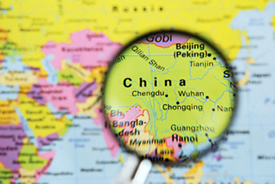The growth China needs and that we all want it to have
 Wednesday, September 1, 2010 at 12:10AM
Wednesday, September 1, 2010 at 12:10AM  Pull back that lens, comrade!
Pull back that lens, comrade!
One FT op-ed and two full-pager analyses.
The op-ed from Yu Yongding, a Chinese academic and former official of the Chinese central bank: the fear of lots of wasted investment with this public-spending infrastructure splurge, plus deep concern over the stunning rise in housing costs over the past couple of years. The good news? Chinese tightening of the money supply seems to be working. Problem is, any slowdown always freaks the central gov, which now considers pumping more money back in.
Better the gov stands firm, says Yu, and let housing prices drop. Chinese banks have the assets to deal with even a 30% dive in prices.
The bigger problems: "over-dependence on investment and external demand, an unacceptably wide gap in incomes, too few social goods and an underdevelopment of the service sector." Reforms and anti-corruption efforts have also slowed.
Over time, Yu says, the investment route (or what I refer to as extensive growth) will reach natural ceilings "imposed by social, environmental and natural resources." Meanwhile, China's push for more exports is creating a bad backlash abroad.
The conclusion:
China has concentrated obsessively on GDP growth for far too long. But growth is not a good excuse for postponing much-needed structural adjustment.
And adjustments naturally translate into slowdowns: hence the op-ed's title that "China needs slower, better growth."
The two full-pagers give some sense of the regional danger (can Asia sustain enough growth to become the engine of the global economy for the next stretch?) and the internal hope (China's second-tier cities in the next geographic band inward from the coast now service as the engine of growth for the nation itself.
I think the latter, which I've talked about years ago in previous books, is finally coming to pass--and just in time. It's good for China's stability, the region's economic trajectory, and the world economy at large. As I always say in briefs, we don't want to own the problem of China's interior poor, thus we must accept that China's protectionism and "cheating" will need to continue for some time.
After the interior belt is developed, however, all China is left with is the vast, relatively uninhabited West.
For now, the competition is clear enough: when the coastal jobs go, do they go to Vietnam and others in the region? Or do they go inland?
Tricky row for China to hoe. Can't be too piggy, but need to be selfish enough.
However much China succeeds, its vision is turned somewhat inward--not necessarily a good thing for the world at large.
 China,
China,  development,
development,  global economy | in
global economy | in  Citation Post |
Citation Post |  Email Article |
Email Article |  Permalink |
Permalink |  Print Article
Print Article 









Reader Comments (2)
I'm afraid this type of topic would show up too often in the dialogues of the emperors and their wise men ... with little lasting results. The last time China took inland growth seriously was when the Russia made transcontinental expansion part of its strategy.
There are a few signs that China is investing in efficient energy, transportation and communications suitable to such an inland expansion, but its hard to change a culture. I took a short tour of China in 1980s when they began to welcome outsiders. When I asked our guide about what was going on in their West, he said they were not really Chinese, and that China would always focus on the opposite direction.
Perhaps a country like Japan that remains isolated at home, but likes selective foreign ventures, could become a partner to China in looking West.
Another thought on my old China trip. One of the first places on our tour was a village where Sun Yat-sen had lived for awhile near Hong Kong. It was well cared for, simple, but treated like a significant memorial. Most of the tourists wanted to move on to trips to The Wall and the old emperor places. There was no English language signs, or handouts, explaining Sun Yat-sen's significance to the political and economic evolution of China. His "Three Principles of the People - nationalism, democracy, and the people's livelihood" are sometimes discussed in US college history courses. But the tourists were uninformed, and our guide was silent. I guessed it was because China was not yet ready to highlight positive steps in China's history before Mao.
Another odd factor. China let poor (but friendly) children gather at the Hong Kong border to ask tourists for treats, $, or food. It was evident that they were from poor families, but they were happy about situation. It should have been easy for Chinese authorities to restrain the kids from border area. But, even though our tour guide was not happy about the situation, neither he nor the border guards took any action.